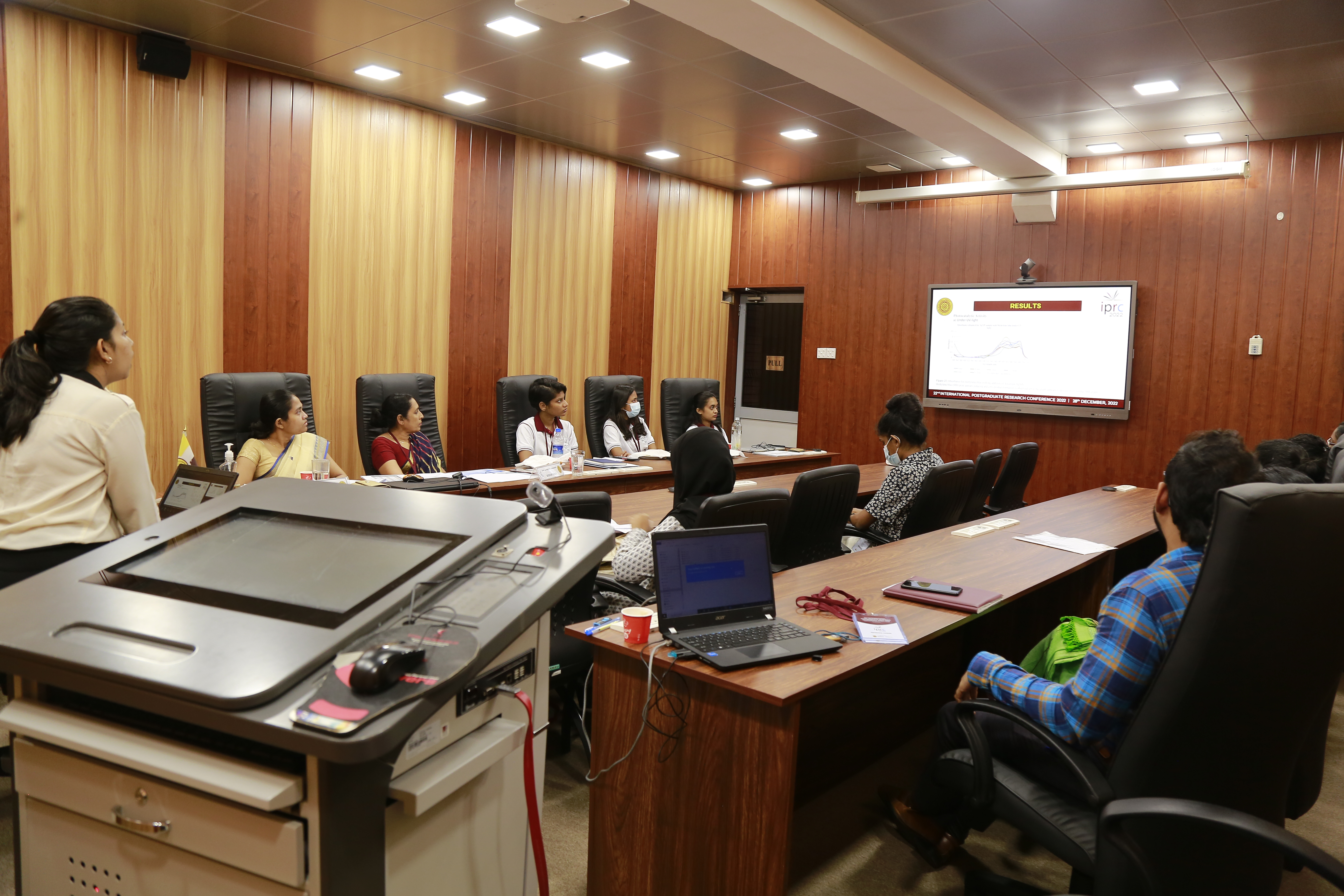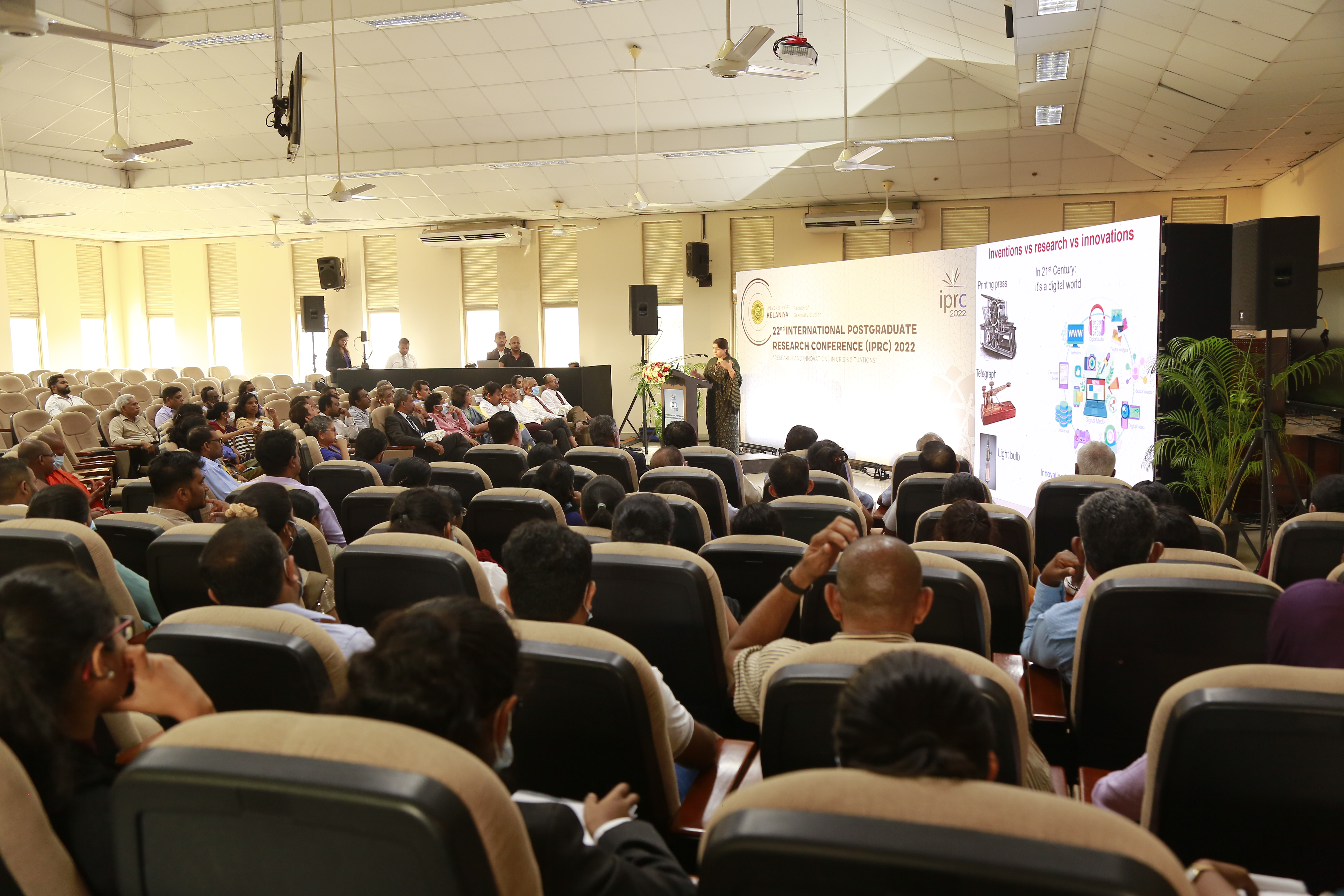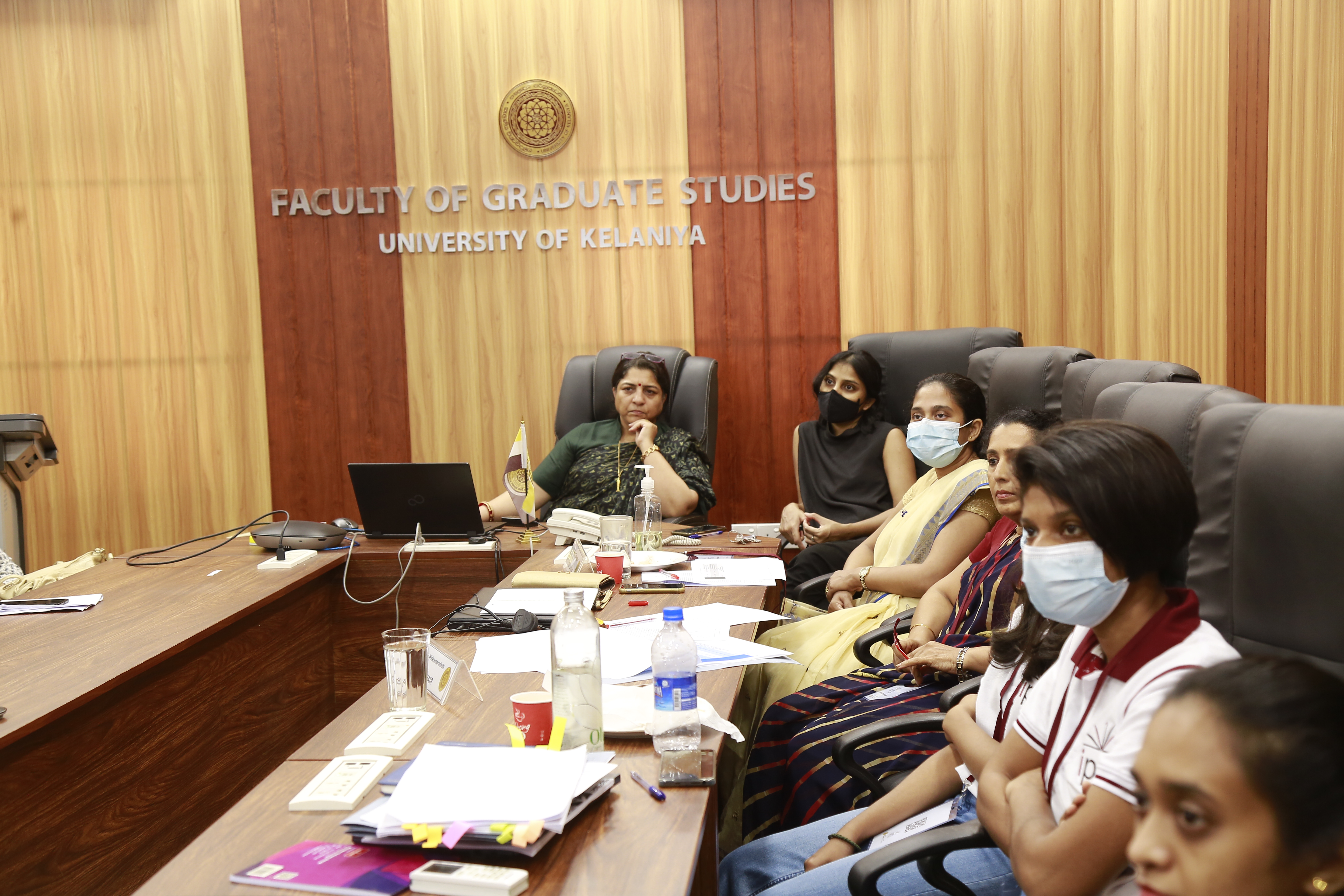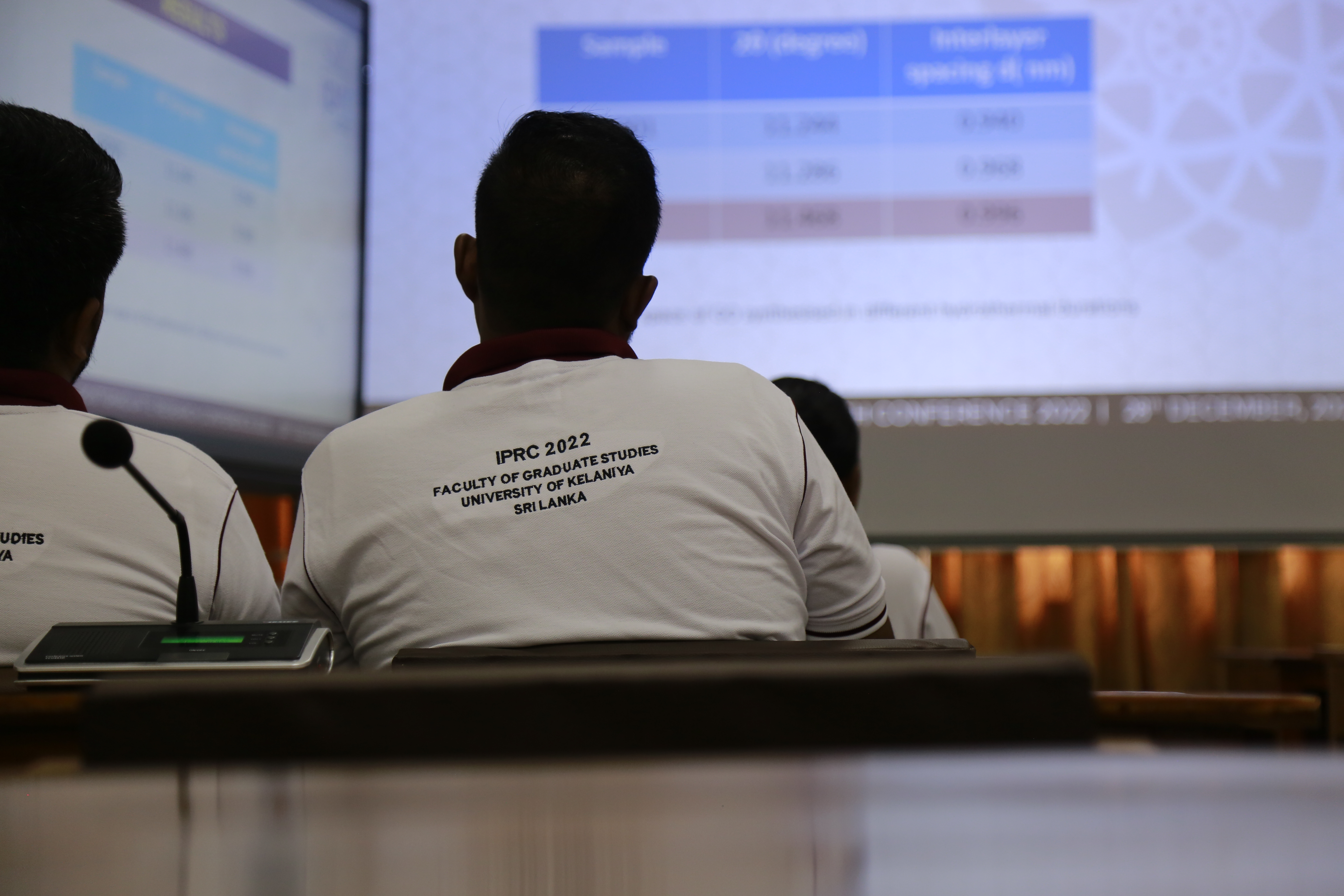International Postgraduate Research Conference (IPRC)
About IPRC
The Faculty of Graduate Studies (FGS) of the University of Kelaniya (UoK), Sri Lanka, was established on the 3rd of January, in 1998. The faculty was able to successfully host its inaugural research symposium with the support of the vibrant academic community within two years of its establishment, marking a major milestone in the development of the research culture at the University of Kelaniya.
Since 2000, the FGS has been actively organizing an annual research symposium. The conference was originally named the "Annual Research Symposium (ARS)” from 2000 until 2014. Over the years, the symposium has evolved in name and scope, showcasing diverse research and innovations in various disciplines.
It was renamed the "International Postgraduate Research Conference" (IPRC) as a part of a rebranding initiative that was launched in response to the conference's increased international participation and its expanding multidisciplinary nature.
IPRC holds the esteemed title of being the oldest and most pioneering research conference at the UoK, continuing over two decades, a reflection of the constant dedication of FGS to encourage advanced research. It has successfully held 23 successive annual conferences, making it a flagship event in the academic calendar of the University of Kelaniya.
The FGS has evolved through its annual research conference, serving as a platform for knowledge exchange in prevailing local and global contexts to provide participants with the most recent insights and discussions. Every theme that the IPRC has addressed throughout the years has emphasized its commitment to foster an active research culture, encourage faculty innovation, and promote intellectual growth. Captivating themes like "The Multi-Faceted Nature of Research in the 21st Century (2012)" and "Collaboration & Innovation in Research (2013)" showcased the faculty's early focus on understanding research trends and fostering collaboration. The central focus of the theme "Discourse values of Sri Lanka; reconciliation, development, equality, and pluralism (2014)" is to promote dialogue, understanding, collaboration to address Sri Lanka's reconciliation challenges.
With the IPRC, the conference gained international recognition, exploring themes like "Dynamic Collaborations: Creativity, Innovation, and Stability (2016)", “Research for Sustainable Development, Applications Beyond Publications (2017)”, “Multi-disciplinary research for Sustainable Development: Issues, Challenges and Way Forward (2018)” , “Sustaining Multidisciplinary research through Digital transformation/s (2019)” and continued to prioritize multidisciplinary research, digital transformations, and sustainable research in a changing world. Notably, the conference highlighted “Sustaining Excellence in Multidisciplinary research in the Context of the new Normal (2021)” and “Research and Innovations in Crisis Situations (2022)”, demonstrating adaptability and dedication to addressing global challenges through academic inquiry.
The conference serves as a catalyst for scientific, economic, social, cultural, and sustainable development. Over the years, IPRC has been privileged to serve as a consistent platform for practitioners, academics, policymakers, researchers, and postgraduate students to share their experiences and expertise. It also promotes collaboration, knowledge exchange, the exploration of innovative solutions to the challenges posed by crisis situations, and quality of life.
From its inception, IPRC aimed to create a platform to provide opportunities for young researchers and postgraduate students to present their high-quality research across different fields of study, share their findings, and share their experiences with a wider audience. At the same time, IPRC contributes to the advancement of various fields of study to establish a much-needed "Research Culture" in the university system.
Now, as the faculty prepares for its upcoming conference in November 2023, under the theme "Enrichment of Academic Strength through Research" reflects the significance of continuous learning through exploration in research. It seeks to highlight the importance of conducting further studies to validate findings, staying updated with the latest technologies and methodologies, and understanding how to translate theoretical knowledge into practical applications. By fostering a culture of ongoing research and awareness across all disciplines, we aim to empower researchers to make meaningful contributions that positively impact real-world scenarios.
The IPRC 2023 expanded its focus to address issues and emerging concepts in various domains, including Science, Computing and Technology, Mathematics, Medical Science, Accounting, Business and Management Studies, Humanities, Social Sciences, Digital Learning, and Multidisciplinary Studies, and the role they play in scientific, economic, social, cultural, and sustainable development.




History of IPRC
29th November 2024
24th INTERNATIONAL POSTGRADUATE RESEARCH CONFERENCE (IPRC) - 2024
Total Number of Abstracts : 130
29th November 2024
24th November 2023
23rd INTERNATIONAL POSTGRADUATE RESEARCH CONFERENCE (IPRC) - 2023
Total Number of Abstracts : 107
28th December 2022
22nd INTERNATIONAL POSTGRADUATE RESEARCH CONFERENCE (IPRC) - 2022
Total Number of Abstracts : 113
28th December 2022
30th December 2021
21st INTERNATIONAL POSTGRADUATE RESEARCH CONFERENCE (IPRC) - 2021
Total Number of Abstracts : 59
30th December 2019
20th INTERNATIONAL POSTGRADUATE RESEARCH CONFERENCE (IPRC) - 2019
Total Count of Abstracts : 193
30th December 2019
05th December 2018
19th INTERNATIONAL POSTGRADUATE RESEARCH CONFERENCE (IPRC) - 2018
Total Count of Abstracts : 205
08th December 2017
18th INTERNATIONAL POSTGRADUATE RESEARCH CONFERENCE (IPRC) - 2017
Total Count of Abstracts : 192
08th December 2017
08th - 09th December 2016
17th INTERNATIONAL POSTGRADUATE RESEARCH CONFERENCE (IPRC) - 2016
Total Count of Abstracts : 243
10th - 11th December 2015
16th Annual Research Symposium
10th - 11th December 2015
30th - 31st October 2014
15th Annual Research Symposium
Total Number of Abstracts : 125
28th - 29st November 2013
14th Annual Research Symposium
Total Number of Abstracts : 97
28th - 29st November 2013
22nd - 23rd November 2012
13th Annual Research Symposium
Total Number of Abstracts : 185
30th November 2010 - 01st December 2010
11th Annual Research Symposium
30th November 2010 - 01st December 2010
18th - 19th December 2008
09th Annual Research Symposium
19th December 2007
08th Annual Research Symposium
19th December 2007
08th December 2006
07th Annual Research Symposium
09th October 2005
06th Annual Research Symposium
09th October 2005
25th November 2004
05th Annual Research Symposium
14thNovember 2003
04th Annual Research Symposium
14thNovember 2003
15thNovember 2002
03rd Annual Research Symposium
19thOctober 2001
02nd Annual Research Symposium
19thOctober 2001
24thNovember 2000
01st Annual Research Symposium
